The Supreme Court, which is hearing arguments on a batch of pleas seeking legal sanction for same-sex marriage, said on Thursday the inflow of cases in the apex court is so heavy that it is impossible to list constitution bench matters unless the time taken to argue is rationed.
Chief Justice D Y Chandrachud, who is heading a five-judge constitution bench which is hearing the matter, said the chief justices before him had not set up constitution benches because of the kind of pressure which is there in terms of the inflow of matters.
“If constitution benches really have to go on, you know, with five judges leaving their regular works…. That is why chief justices before me have not constituted constitution benches because you don’t know the kind of pressure. Every evening I ask what is the filing and how much is the disposal,” he said.

“We don’t want to add. That is the real problem in our court. The inflow is so heavy, unless we start rationing time, you know, it is impossible to list constitution benches,” said the CJI, who is heading the bench, which also comprises Justices S K Kaul, S R Bhat, Hima Kohli and P S Narasimha.
At the beginning of the hearing on the same-sex marriage issue for the third successive day, a counsel handed over to the bench a list of lawyers who would argue on behalf of the petitioners along with the indicative time which they would take.
The CJI said the petitioners’ side will have to conclude their submissions by the end of the day as the court has to give sufficient time to the other side as well.
“You know, if I am having a very long telephonic conversation, my better half only does this to me, which is, please now get on with your work and stop the conversation,” Justice Chandrachud said in a lighter vein and asked senior advocate A M Singhvi, who was to argue for one of the petitioners, to continue with his submissions.
“There are Supreme Courts where the entire arguments could be over in 30 minutes. We have given three days (to the petitioners’ side) in this court, I think that is good enough,” the CJI said.
Justice Kaul said the bench had indicated in the very beginning the issue on which it would focus and deal with in the matter.
The CJI said Singhvi could conclude his submission within 45 minutes and after that the court will give hour-and-a-half between senior advocates Raju Ramachandran and K V Viswanathan, who are also appearing for some of the petitioners.
Senior advocate Anand Grover, appearing for some petitioners, asked, “Why should one person get more time than the others?”
The bench said in the next week it will sit on Monday, Tuesday, Wednesday and Thursday so that arguments from both the sides could be over.
When Grover referred to diversity of views on the issue, the CJI said, “Then you can merrily go on in July. We have no problem.”
“People have to be bound by time,” Justice Kaul said, adding, “Look at the time schedule given. Is this a realistic time schedule?”
One of the advocates said they would cut down the time indicated and the petitioners’ side will conclude their submissions on Monday.
“You people also know this case has been taken up on some priority. We are trying to wind it up. If you don’t want to wind it up, you don’t wind it up,” Justice Kaul said.
Justice Chandrachud said the estimated time given by the petitioners’ side is about 16 hours which means four complete days for one side.
“It can’t be like this,” Justice Kaul said, adding, “Nuances can’t be addressed as if you are beginning a new case.”
Justice Bhat said the oral hearing which is happening in the matter is meant to give some voice to the people.
“But our real work begins after that. So don’t be under the impression that if you don’t get to address your contents, we will not apply our minds. Our duty lies elsewhere. Once this is over, the whole court system is right now geared as though everything depends on what you say or what you don’t say. It is not correct,” he said.
Justice Bhat said, “Please keep that in mind and restrain yourself to the extent possible and present the clearest picture without taking us through too many things.”
The hearing then started with Singhvi resuming his submissions.
At the end of the day’s hearing, the bench asked the petitioners’ side to complete their submissions on April 24, the next date of hearing.
During the hearing on Wednesday, the bench had emphasised on the need to finish a matter in a time-bound manner, saying there are other cases waiting to be heard.
The judicial outcome in the matter will have far-reaching consequences for the country that is sharply divided on the subject of same-sex marriage.
The apex court had on November 25 last year sought the Centre’s response to separate pleas moved by two gay couples seeking enforcement of their right to marry and a direction to the authorities concerned to register their marriages under the Special Marriage Act.







